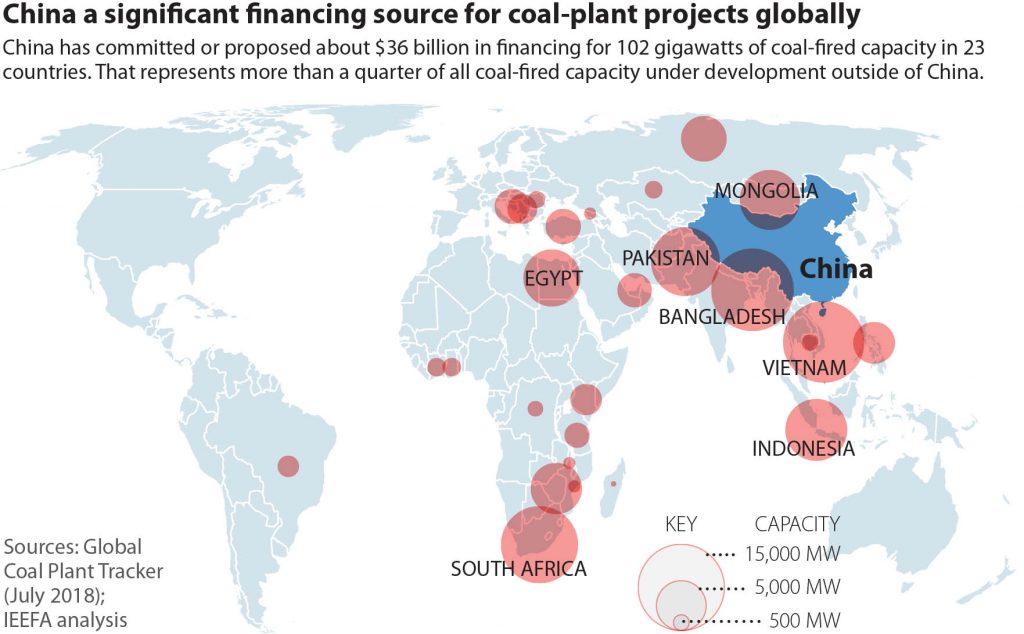The 76th UN General Assembly was held on Tuesday, 14th September. In the assembly, China’s top leader Xi Jinping announced that China will not be building any more coal-powered plants abroad. This is a major announcement as China has been lending financial support to many governments of foreign countries for coal-powered projects for over a decade. But now China stops funding coal-powered projects abroad.
The move made by China is appreciated worldwide as the use of coal raises the global temperature exponentially. Scientists from all over the world warned us about the use of coal. China is the 2nd biggest economy in the world and also the biggest domestic producer of coal. They are also the largest financier of coal-power plants all over the world and a statement such as this has received many positive reviews.
China’s announcement could be a step toward them catalyzing green transformations.

Dr. Kevin P. Gallagher is a professor at Boston University’s Pardee School of Global Studies. He has been tracking China’s global financing of energy. He stated that “China’s announcement could be a step toward them catalyzing green transformations.” He also said that major public financiers of coal energy will also be backing away as well.
China is the biggest coal-power producer

No other country in the world can produce as much coal power as China. In the last year, China built three times more coal power than all other countries combined. According to the estimation of the Center for Research on Energy and Clean air, they built more than one large coal power plant per week.
By last year, China’s net construction of coal power capacity grew by 29.8 gigawatts (1 gigawatt can power 300,000 homes) beating the rest of the world, whose coal power capacity decreased by 17.2 gigawatts.
Countries funded by China for coal-powered plants
Many countries such as South Africa, Ukraine, Bangladesh, Russia, Turkey have partnered with China for coal-powered projects. Over a dozen countries, mostly around Asia, are funded by China for coal-powered plants. According to Boston University Global Development Policy Center, the China Development Bank and the Export-Import Bank of China together funded $474 million worth of coal-powered projects outside of China in 2020 alone. Most of the funds are poured into Asia.
Indonesia is China’s biggest client in coal-mining projects. It has a total of 21 projects with over $9.3 billion in investment. Vietnam comes second, where it has 13 projects with an $8.8 billion investment. Pakistan has 7 projects with a $4.5 billion investment according to the Boston University tracker.
China Abandoning coal?
According to a group called Greenpeace China, domestically China produces about 1,200 gigawatts of power from coal. The coal power produced in other countries helped by China produces less than 100 gigawatts.
In Xi Jinping’s speech, he didn’t mention domestic production. The country’s latest Five-Year Development plan approved earlier this year, it allows the expansion of coal-power plant construction at home for years to come. From some recent news from locals, China will be abandoning coal power in the future. For this, they will be turning off power for 2 days a week.
What about the under-construction and signed projects?
According to Li Shuo, a policy adviser with Greenpeace China, currently, there are a total of 20 countries with coal power plant projects funded by China. About 40 gigawatts of power will be produced from these plants. According to Li, for some of these countries, it would be impossible to complete these projects without the assistance of China. Because they lack the finance, steel mills, and engineering expertise, they cannot proceed with the project, according to Li.
Li further stated that “For some(countries), it’s a deal-breaker. If you don’t have Chinese support, you won’t have these projects.”
Countries other than China, financing coal-power plants
Japan and South Korea are the two biggest financiers of coal-power plants abroad other than China. But in April, South Korea announced its plans to stop funding coal power plants abroad and in May, Japan did the same.
Since South Korea and Japan canceled their funding, China’s plans in funding coal-powered plants abroad were going to grow, according to Lauri Myllyvirta, an analyst with the Centre for Research on Energy and Clean Air, a research organization.
Conclusion
China’s decision is appreciated by many but there were many points that were unclear in Xi Jinping’s speech.
- When Xi Jinping said “China will not be building any more coal-powered plants abroad”, he didn’t specify if it applied to government companies or private companies
- It wasn’t specified if “building” meant no more financing or if the new policy would apply to projects that have already been proposed, approved, or are under construction.
Even Though the decision is better for the environment, the growing infrastructure of the modern world demands more power. If we cannot rely on coal power, we will face some heavy challenges in the future. But the news is confirmed that China stops funding coal-powered projects abroad.